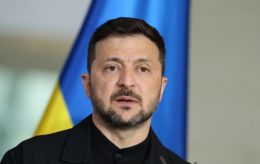Euroclear cites fear of Putin retaliation to justify blocking Russian asset seizure
 Belgian depository Euroclear (photo: google.com)
Belgian depository Euroclear (photo: google.com)
In Belgium, the Euroclear depository — which holds the majority of Russia's frozen assets — has justified its resistance to confiscating Russian funds by claiming it fears possible retaliatory actions from the Kremlin, Financial Times reports.
Euroclear CEO Valerie Urbain sent a letter to European Commission President Ursula von der Leyen and European Council President António Costa. In the letter, Urbain claimed there were alleged risks associated with the reparations loan proposed by Europe.
Urbain stated that providing assistance to Ukraine by directly using Russia's frozen assets would be perceived globally as confiscation — particularly, she said, in countries outside the European Union.
According to her, such a precedent could allegedly scare investors who purchase European sovereign debt, including sovereign wealth funds and central banks of other states (Urbain did not provide specific examples). She argued that this would be viewed as an alleged violation of the rule of law.
The letter also states that the obligation to invest Russia's assets into special interest-free debt instruments would allegedly lead to unspecified "retaliation" from Russia. Urbain claims she fears so-called legal claims from the Kremlin, which must be protected by Euroclear.
Therefore, the Belgian depository is demanding unconditional guarantees to cover risks for "as long as there remains legal exposure." By this, Urbain refers to risks from Russia and "any other risks related to the subscription of the instrument."
On November 26, von der Leyen announced that the European Union would, in the coming days, present a legislative proposal allowing frozen Russian assets to be used to provide Ukraine with a €140 billion reparations loan. It was possibly this announcement that alarmed the depository, which is resisting the seizure of Russian assets by all possible means.
Meanwhile, European countries are developing a plan B in case they are unable to agree on using frozen Russian assets to provide a reparations loan to Ukraine.
The United States, incidentally, also attempted to "lay its hands" on Russia's frozen assets. Under the so-called peace plan developed in the Kremlin and handed to Washington, $100 billion would be allocated to Ukraine's reconstruction, with a 50% profit share for the US, while the remaining funds would be invested in a joint US–Russia investment fund. This angered Europe and Ukraine, so this provision was removed entirely from discussions on a potential peace agreement.

